INDIRECT TAX STUDY CIRCLE
Indirect Tax Study Circle Meetings on 6th, 24th and
27th December, 2018 at BCAS Conference Hall.
Indirect Tax Study Circle organised three Study Circle
Meetings on 6th, 24th and 27th December, 2018 in which
participants discussed practical approach and various
aspects that need to be kept in mind in GST Audit and
documentation thereof. The discussion was done based
on contents of Annual Return (GSTR-9) and members
broadly covered Part II of GSTR-9C i.e. audit of B2B, B2C
supplies, Exports and Supply to SEZ, Stock Transfers,
Advances, Credit notes and Debit notes etc., for taxable
and exempt outward supplies. The extent of checking and
auditors’ responsibility was also discussed.
The benefit of meeting was also extended to outstation
members by live streaming the sessions. All the sessions
were very interactive and informative and members
participated in large numbers.
“Workshop on Data Analytics for Business and
Audit with Power BI” held on 14th December, 2018
at BCAS Conference Hall.
Technology Initiatives Committee of the Society conducted
a half day workshop on Data Analytics for Business and
Audit with Power BI on 14th December, 2018 at BCAS
Conference Hall.
The session was led by CA. Nikunj
Shah having rich experience in
training and consulting on Data
Analytics for Business Decision
making, Audit and Investigation. He
explained that Microsoft Power BI is
a business intelligence platform that
offers business analytics toolset. It is designed to assist
businesses in their efforts to systematically analyse data.

The Speaker highlighted current limitations of excel
usage and thereby deliberated on the features of Power
BI. He discussed key reasons for shifting to Power BI
applications and gave the demo of Power BI features and
also shared his in depth knowledge on the issues such as
(a) How to analyse data from single and multiple sources
(b) How to create your individual dataset based on
multiple sources and transform your results into beautiful
and easy-to-make visualisations (c) How to share your
results with your colleagues or collaborate on your project
(d) How to make best use of Cloud based features of
Power BI (e) How to generate reports.
The session was highly interactive and the Speaker
resolved all the queries raised by the participants who
benefited a lot and appreciated the efforts put in by the
speaker and group leaders.
Full day seminar on “Estate Planning, Wills &
Family Arrangement/Settlement – Critical Aspects”
held on 15th December, 2018.

The Full day seminar on
Estate Planning, Wills & Family
Arrangement/Settlement – Critical
Aspects was held by the Corporate
and Allied Laws Committee at Indian
Merchants Chamber, Churchgate.
The event was attended by over
85 participants
including more than 10 outstation
participants. President CA. Sunil
Gabhawalla gave the opening
remarks followed by introductory
words from the Chairman of
the Corporate and Allied Laws
Committee, CA. Chetan Shah.

Mr. Nishith Desai gave keynote address explaining
the basic principles of estate planning and how the mechanism to put the same into
effect is changing with increase of
global mobility.

CA (Dr.) Anup Shah explained the
succession laws for Hindus, the
developments in the laws relating
to succession, practical aspects of
creating a will and essential do’s
and don’ts that one should keep in
mind before choosing an appropriate
vehicle for succession planning. He
briefly dwelled upon the FEMA and
other issues that would also merit
consideration in picking the right
vehicle.

Ms. Shipra Padhi gave an insight on
documentation aspects and spoke on
the intricacies of various documents
covered in Estate planning, Family
settlement/arrangements including
Wills.

CA. Pradip Kapasi enlightened
on the taxation aspects of family
arrangements with the help of various
relevant case laws. He discussed
various taxation issues arising out
of family arrangements including
partitions of families, validity of family
arrangements as upheld by Courts
and position taken by the courts in issues arising from
the same. He also touched upon stamp duty implications
arising in such transactions.
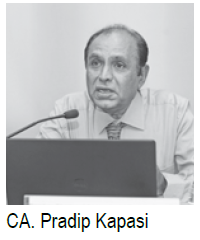
CA. Yogesh Thar explained the tax
implications of Trusts and Estate. He
deliberated upon the tax principles
on trusts, HUF taxation and filing of
returns of income of the deceased,
returns of the executors of estate as
also the practical issues arising in
such cases.

With the interactive session and their insights on the
subject shared by the speakers, the participants benefited
immensely. On this occassion BCAS Publications: “Changing
Paradigms of Corporate Social Responsibility in India” and
“Securities Laws-An Introduction” were also released.

TECHNOLOGY INITIATIVES STUDY CIRCLE
Technology Initiatives Study Circle Meeting on
“Zoho Project Management” held on 18th December,
2018 at BCAS Conference Hall.
Technology Initiatives Committee of the Society conducted
a Study Circle Meeting on “Zoho Project Management”
on 18th December, 2018 at BCAS Conference Hall. The
study circle was led by Mr. Eshank Shah, Chartered
Accountant and Chartered Financial Analyst (USA) and
Head of Startup and Transaction Advisory at Banshi Jain
and Associates (BJAA).
CA. Eshank Shah discussed Zoho application and shared
his in depth knowledge with the participants. He also
explained Zoho Application from Planning and execution
stage to capture details of engagements stage including
the benefit of Zoho Application and how to use more
effectively in a business environment. He further resolved
all the queries raised by the participants during the session.
The session was a huge takeaway for the participants
who appreciated the efforts put in by the speaker and
group leader.
Workshop on NBFCs (including IND AS
Implementation Challenges and Regulatory
Updates) held on 21st and 22nd December, 2018.
Accounting and Auditing Committee organised a
workshop on NBFCs on 21st and 22nd December, 2018 at
Orchid Hotel, Vile Parle (East), Mumbai.
The NBFC sector is of late facing several challenges.
Besides the business and regulatory challenges, the
sector is also facing Ind AS implementation (for companies in the 1st implementation phase) challenges and other
compliance challenges of GST etc. Further NBFC sector
is growing at a substantial pace but it is RBI’s endeavour
to ensure prudential growth of the sector, keeping in view
the multiple objectives of financial stability, consumer and
depositor protection and need for more players in the
financial market, addressing regulatory arbitrage concerns
while not forgetting the uniqueness of the NBFC sector.
In view of regulatory norms being notified on a frequent
basis, including Ind AS implementation challenges for
NBFCs and there being changes in Statutory Audit
requirements and various developments in the Taxation
arena, BCAS conducted a Two days’ Workshop on
NBFCs. The Workshop was structured into five sessions
which dealt with important aspects of key regulatory
updates, Issues in IND AS applicability in respect of
Financial Instruments and ECL model applicability,
Statutory Audit Aspects under the Companies Act, 2013,
Disclosure requirement under revised Schedule III and
Taxation Development and issues in
the Direct taxes and GST for NBFCs.
The Workshop started with the
inaugural address by BCAS President
CA. Sunil Gabhawalla, who provided
his view points on the importance of
NBFCs in the overall development
of the financial sector in India. CA.
Himanshu Kishnadwala, Chairman
of the Accounting & Auditing
Committee introduced the structure
of the Workshop.
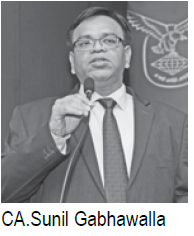

The first session was commenced
by CA. Bhavesh Vora who lucidly
dealt with the important aspects of
key regulations. While dealing with
the same, he also took participants
through the overall maturing of the
NBFC sector over last three decades
and gave valuable insights on
the regulatory impacts on various
categories of NBFCs.

The second session was dealt
with by CA. Viren Mehta on the
implementation issues of Ind AS
with respect to classification of
Financial Instruments based on the business models and measurement of various Financial
Instruments.

Another session was by CA. Rukshad
Daruvala, who dealt with the important
topic of key issues and requirement
in respect of applying the Expected
Credit Loss Model which deals with
provisioning requirement of Advances
of NBFCs by way of various examples.

Concluding session on Day 1 was
by CA. Sumit Seth, who appraised
the participants with the new
requirements of the schedule III
disclosures including various critical
disclosures required under the Ind
AS regime.
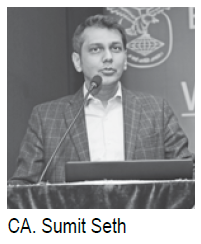
On Day 2, the first session dealing
with Statutory Audit aspects under
the Companies Act, 2013 was
addressed by speaker CA. V. Venkat.
He dealt elaborately with the unique
requirements while conducting
audit of NBFCs and shared his vast
experience with the participants and
explained the importance of Audit
under the current economic scenario.

The second session was taken
up by two speakers: explaining
in detail the nuances of Direct
taxes by CA. Yogesh Thar and
GST requirement by CA. Parind
Mehta. They made the session very
interactive and shared their practical
experience of tax applicability to the
NBFC sector.


Before the concluding session,
participants were shown a 45 mins video on practical
Fraud in the industry and had a short discussion on the
same.
Overall the Workshop was an enriching experience for
the participants.
Training Session for CA Article Students on ‘GST
Annual Return’ and ‘GST Audit from Article’s
Perspective’ held on 4th January, 2019 at BCAS
Conference Hall.
The Students Forum under the auspices of HRD
Committee organised a Training Session for CA Article
Students on the above-mentioned topics on 4th January,
2019 at BCAS Conference Hall.
The first session on GST Annual
Return was taken by CA. Raj Khona
followed by a session on GST Audit
by student Speaker Mr. Dynanesh
Patade and CA. Jigar Shah. Ms.
Neelam Soneja, the student coordinator
introduced the speakers for
the session and spoke about various
activities conducted by BCAS Students Forum.
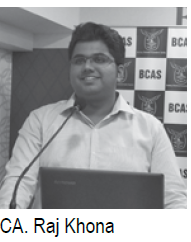
CA. Raj Khona explained the entire Form GSTR-9 clause
by clause and dealt with the various issues / complexities
involved in the annual return form. He highlighted few key
areas which article students should keep in mind while
filing the annual returns.
In the second session, CA. Jigar
Shah in his opening remarks briefly
introduced the topic and gave a brief
insight on various aspects of GST
Audit. Mr. Dynanesh Patade, the
student speaker thoroughly explained
the entire form GSTR-9C and shared
his meticulous detailing in conducting
GST Audit. He also gave useful tips to the article students
on how to effectively conduct GST Audit. The mentor for
the session CA. Jigar Shah then presented the certificate
of appreciation to Mr. Dynanesh Patade and applauded
the meticulous presentation made by him.
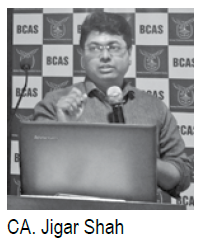
With the due dates for GST Audit fast approaching and
every CA firm wanting its articles to be well equipped
with the nitty-gritties of GST Annual return and GST
Audit, the training session saw a record participation
by 150+ students. The session ended with student coordinator
Ms. Neelam Soneja proposing vote of thanks
to the speakers for sparing their valuable time and also
thanked the audience for participating in huge numbers.
Both the sessions were interactive whereby the speakers
answered all the queries raised by the participants.
HDTI STUDY CIRCLE
Study Circle Meeting on “Achieving Cohesiveness
(Like Mindedness) amidst diversity of beliefs
and opinions” held on 8th January, 2019 at BCAS
Conference Hall
Human Development and Technology Initiatives
Committee organised a study circle meeting on the topic
“Achieving Cohesiveness (Like Mindedness) amidst
diversity of beliefs and opinions” on 8th January, 2019
at BCAS Conference Hall which was addressed by Ms.
Amrita Singh having 16+ years of hands on Designing,
Training, and Coaching experience. She explained that
at office or at home, we come across situations where
our opinions and beliefs are diverse and we have varied
goals based on this. We need to align our individual goals
to the organisational goals or like the family as a whole to
successfully work together.
The Speaker took the participants through various
situations and discussed how to deal with the same
successfully. She also mentioned about the types of
personalities and the four quadrants like Kool Blue,
Green Earth, Fiery Red and Sunshine Yellow wherein
each person fall into. Each of these personalities have
typical characteristics and each may also have some
characteristics in the other quadrants as well. One can
judge what quadrant one belongs to and improve to
adjust in order to be successful. The participants found
the topic very interesting and relevant in the day to day
personal and professional life and got hugely enlightened
on the subject.
Lecture Meeting on “Changing Risk Landscape
for Audit Profession with special emphasis on
NFRA and other recent developments” held on 9th
January, 2019 at BCAS Conference Hall.

BCAS organised a lecture meeting on
the captioned subject on 9th January,
2019 at BCAS Conference Hall which
was addressed by CA. Narendra P.
Sarda.
The Speaker discussed about the
‘Changing Risk Landscape for
Audit Profession with special emphasis on NFRA and
other recent developments’ i.e. (i) Increasing Risk and
Challenges, (ii) Specific Scam, (iii) Fraud and Failures,
(iv) National Financial Reporting Authority (NFRA), (v) CA
Institutes’ roles in the new regime and Members response
to the recent developments, (vi) Other regulatory changes
impacting the Audit Profession. Various changes and
increasing uncertainties in the audit profession, increasing
use of Fair values, increasing internal and external risk,
regulatory issue, intricacies of reporting requirements and
expectations from Auditors were also well covered and
explained by way of practical examples well designed
to understand the complexities of the Changing Risk
Landscape for the Audit Profession. On this occassion
BCAS Publication “Tax Deduction at Source- Law and
Procedure” was released.
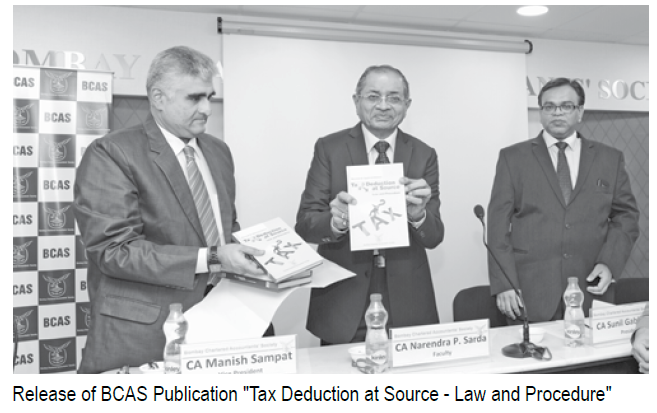
He also explained the various functions and Powers
of NFRA, companies to whom NFRA applies, NFRA
rules, 2018 and various pros and cons of NFRA. He
further elaborated the role of ICAI and response of the
auditors to this new regulatory authority. The lecture
meeting was attended by more than 100 participants
from various Industries and Practice arena. The meeting
was very interactive and the participants got enlightened
immensely.
FEMA STUDY CIRCLE
FEMA Study Circle Meeting on “Critical issues under
Export/Import of Goods and Services” held on
15th January, 2019 at BCAS Conference Hall
A FEMA Study Circle Meeting was held on 15th January,
2019 at BCAS Conference Hall where CA. Kirit Dedhia
and CA. Parag Kotak led the discussion on the topic of “Critical issues under Export/Import of Goods and
Services”. The Group leaders discussed meaning of
the term “Export” and “Import” in relation to the goods,
software and services. Discussion was also on services
other than software where SOFTEX form is to be filed.
The Group leaders discussed agency commission,
setting off and netting off of export receivables against
import payables, export claims, period of realisation,
reduction of invoice value, write off of export receivables
and few compounding orders. The members appreciated
the efforts put in by the group leaders and learnt a lot from
the rich experience of speakers.
INTERNATIONAL ECONOMICS STUDY
GROUP
International Economic Study Group Meeting on
“Road to 2019 Elections and a Nayi Disha for India”
held on 16th January, 2019 at BCAS Conference Hall
International Economics Study Group had their meeting
on 16th January, 2019 to discuss “Road to 2019 Elections
and a Nayi Disha for India” at BCAS Conference Hall. Shri
Rajesh Jain (studied at IIT, Mumbai & Columbia University,
USA, runs India’s largest digital marketing company,
Netcore) led the discussions and presented his thoughts
on the subject. He presented various scenarios for the
2019 elections, implications of each of the scenarios;
options available to BJP etc.
Mr. Jain also expressed concern about India’s economy
post-election due to atmosphere of uncertainty, voters
opting to change rulers rather than rules to solve
our ‘Hamesha’ problems of poverty, unemployment,
corruption, farm distress, SMEs distress etc. He also
suggested consumption-led growth to propel economy,
employment, reduce poverty, reduce over dependence of
rural population on agriculture etc., by monetising surplus
public assets by returning to the people (rightful owners),
a concept of “Dhan Vapasi”. He also suggested an idea of
relooking at our 70+ years old Constitution.
The meeting was very informative and interactive and the
Speaker resolved all the queries raised by the participants.
The participants learnt a lot from the rich experience of
the Speaker.

































